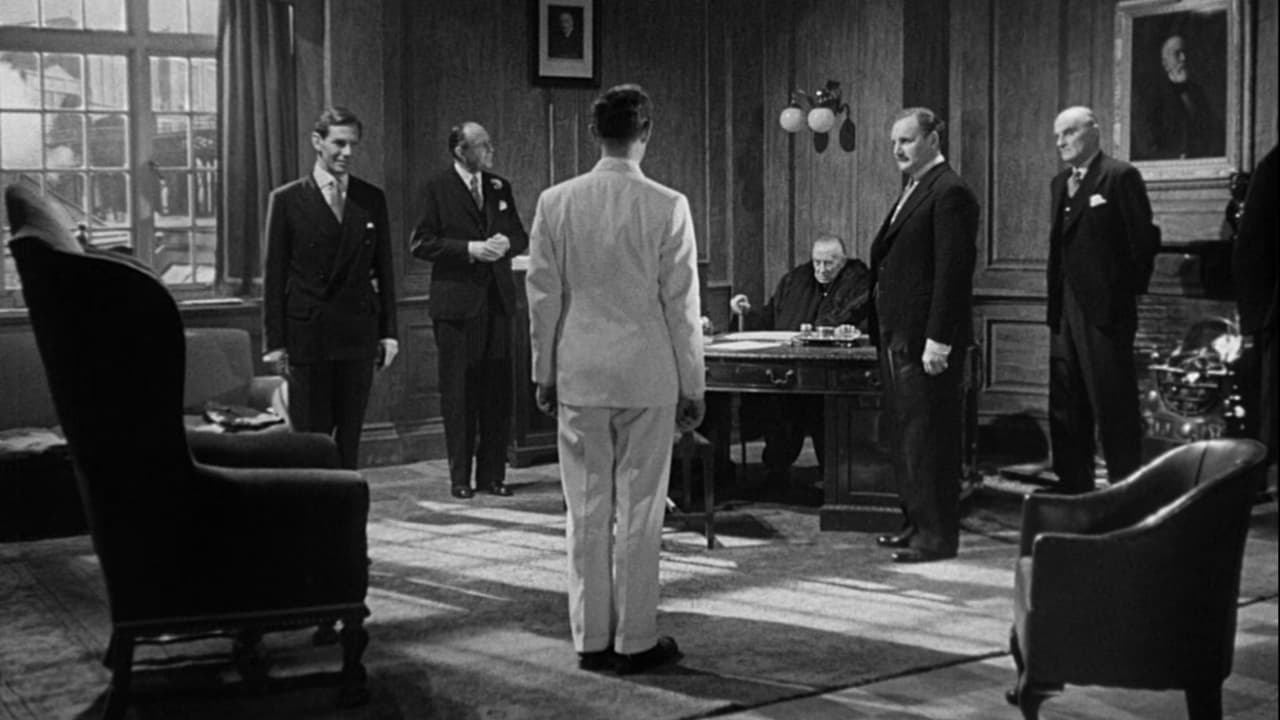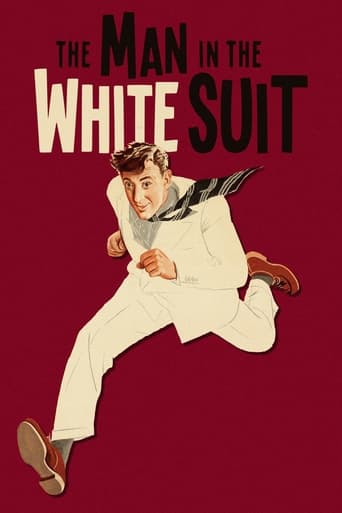

I had heard about this classic film title because of the leading actor, the title made it obvious what is was about, but I didn't know what the context was. I found out it was from Ealing Studios, famous for Kind Hearts and Coronets and The Lavender Hill Mob, and critics gave it good ratings, so I hoped it would be worthwhile, directed by Alexander Mackendrick (Whisky Galore!, The Ladykillers, Sweet Smell of Success). Basically former Cambridge scholarship recipient and humble inventor and scientist Sidney Stratton (Sir Alec Guinness) has been dismissed from jobs at several textile mills in the north of England. Stratton has demands for expensive facilities and an obsession with inventing an everlasting fibre. Whilst working as a labourer at the Birnley Mill, he accidentally becomes an unpaid researcher and invents an incredibly strong fibre which repels dirt and never wears out. From this fabric, a brilliant white suit is made, it cannot absorb dye and is slightly luminous because it includes radioactive elements. Stratton is praised as a genius, but management and the trade unions realise the consequence of his invention, the demand for cloth will decrease and it could put the textile industry out of business. The managers try to trick and bribe Stratton into signing away the rights to his invention, but he refuses, then they and workers try to shut him away, but he escapes. Stratton is pursued by both the managers and the employers, he runs whilst wearing the glowing white suit during the night, but it begins to fall apart as the chemical structure of the fibre breaks down with time. Realising the flaw in the process, the mob triumphantly rip pieces off Stratton's suit, until he is left only wearing his underwear, only the mill-owner's daughter Daphne Birnley (Joan Greenwood) and fellow labourer Bertha (Vida Hope) have sympathy for his disappointment. The next day, Stratton is dismissed from his job, he consults his chemistry notes as he departs, he has a realisation and exclaims "I see!", he strides off, perhaps to try again somewhere else. Also starring Cecil Parker as Alan Birnley, Michael Gough as Michael Corland and Bride of Frankenstein's Ernest Thesiger as Sir John Kierlaw. Guinness is likeable as the quiet, good-natured boffin, this is essentially a story of greed, professional jealousy and fear of progress, I could just about follow everything going on, the white suit stuff is certainly interesting, but I will be honest, I didn't find myself laughing very much, but it is reasonable classic science-fiction satirical comedy. Worth watching, in my opinion!
... View MoreFollows on from The Invisible Man, The Man who could Work Miracles, and others. All science fiction, or speculative fiction, satirises the present status quo. It asks the question: What if ? Often suggesting disastrous answers, but stimulating thought. There is nothing "little" about this film. It combines the scientific with the speculative. It poses, yet again, the conundrum of what would happen if demand is eliminated from our world. If man ceases to have needs his rotating universe collapses: the suppliers of those needs lose their livelihood. Obsolescence is thus required to be built in. Very little today lasts more than ten years before it has to be replaced. It's not love that makes the world go round, but constant, ever-increasing, insatiable demand. The demands of the truly nerdy scientist, nevertheless, are not the same as those of ordinary people. He needs very little money, for himself, for a start.But the special argument of this film is not unduly strong. Rayon and nylon did not render wool and cotton obsolete. Stratton's new fabric, no matter how long-lasting, and dirt-repellent, would not abolish all previous fabrics. Fashion would see to that. Multivarious new fashions would spring up, the demand for old-fashioned clothing would substantially increase. Denim has not made flannel, silk, corduroy or moleskin --- whatever that is --- redundant.Perhaps that's why this film is not quite as effective as "I'm all right, Jack", in spite of being just as brilliantly directed and performed. It's still infinitely better than anything similar produced by Hollywood, although I'll admit "Chinatown" runs it close. The hidden interests, or cover-ups, of mega-business are the same.
... View MoreProduced at the time of the Festival of Britain, a period when Britain was trying to show itself in its most positive light, THE MAN IN THE WHITE SUIT offers a gentle, if pointed corrective. Sidney Stratton's (Alec Guinness') wonderful invention of a suit that never needs washing, and never wears out, threatens the entire future of the British cotton industry and needs to be suppressed. For perhaps the first - and only time - the mill-owners, led by Cecil Parker's Mr. Birnley and Ernest Thesiger's hawk-like Sir John, unite with the workers to frustrate Stratton's plans of success and hence ensure that "the delicate balance of interests" (i.e. the industrial status quo) is maintained. The fact that the cotton industry no longer really exists in Britain is one of the ironies of history; it was chiefly due to an ostrich-like reluctance to change that Britain was overtaken by other countries in Asia. As Parker's narrator accurately foretells right at the end of the film, the Sidney Strattons of this world did achieve what they wanted in the end. Alexander Mackendrick's film is tightly structured with some memorable cinematography by Douglas Slocombe; there are at least two aerial shots of the mill-owners and Sir John gathered in one room, where they resemble predatory beasts ganging up on the luckless Sidney. The chase- sequences are also cleverly handled, with several shots of Sidney's pursuers running down corridors or darkened alleyways. Benjamin Frankel's music, with its memorable theme of the bubbling of Sidney's scientific experiments, reminds us of just how successful and threatening human endeavors can be. Mackendrick also gets some memorable character-vignettes out of Parker - never better in his customary role as a bumbling yet pompous industrialist, Thesiger (screaming "wait for me!" as he relishes the prospect of chasing Sidney, and is bundled into a worker's car), and Joan Greenwood, reprising her role as an incredibly polite yet potent predator from KIND HEARTS AND CORONETS (1949). In the central role, Guinness is remarkably active; his obsessiveness manifesting itself in his increasingly unkempt appearance, that contrasts with his appearance at the end, when the suit has been torn off him. In his undershirt and pants, he resembles a dying swan. THE MAN IN THE WHITE SUIT is, as with all Ealing comedies, a small-scale film, but one that befits repeated viewings in order to understand its quiet subtleties. A classic.
... View MoreWhat provoked me to write this review was the commentaries made on the blu-ray disc recently issued. There, in the "extra"-compartment, three nincompoops discuss the film, totally unable to see the obvious. Anyone who sees the film will not have to look far that it is a film about how "business" makes progress almost impossible. It shows, without a doubt, that greed (the owners) and stupidity (the workers that are unable to think outside the box and realize that if capitalism disappears they will all have to work much less if there is progress) are not the friends of innovation. Greed only supports innovation as far as putting a pressure on the workers and increasing the profit. Greed will however never support an innovation that puts a stop to continuing business by killing the market altogether by producing a good that is virtually unbreakable. All these remarks are beautifully displayed in this film, which still remains the best statement on these subjects although it was made more than 60 years ago!! Probably, the film is even more revolutionary today (especially if you consider the idiotic remarks already commented on) than it was when it was made. See for yourself!!!
... View More